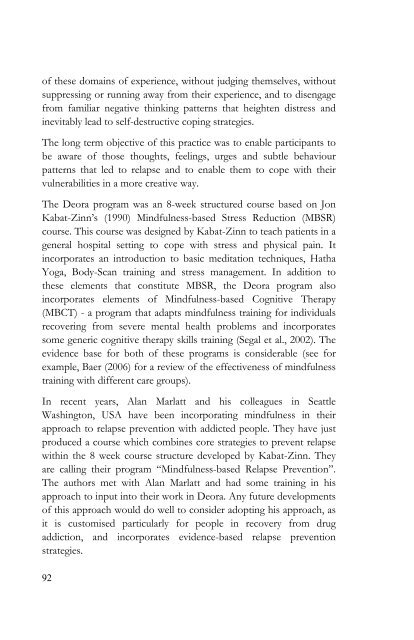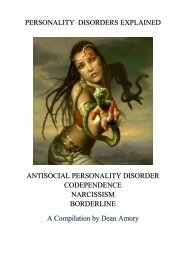Introduction to Mindfulness - Dean Amory
Art and Benefits of Mindfulness Meditation
Art and Benefits of Mindfulness Meditation
You also want an ePaper? Increase the reach of your titles
YUMPU automatically turns print PDFs into web optimized ePapers that Google loves.
of these domains of experience, without judging themselves, without<br />
suppressing or running away from their experience, and <strong>to</strong> disengage<br />
from familiar negative thinking patterns that heighten distress and<br />
inevitably lead <strong>to</strong> self-destructive coping strategies.<br />
The long term objective of this practice was <strong>to</strong> enable participants <strong>to</strong><br />
be aware of those thoughts, feelings, urges and subtle behaviour<br />
patterns that led <strong>to</strong> relapse and <strong>to</strong> enable them <strong>to</strong> cope with their<br />
vulnerabilities in a more creative way.<br />
The Deora program was an 8-week structured course based on Jon<br />
Kabat-Zinn’s (1990) <strong>Mindfulness</strong>-based Stress Reduction (MBSR)<br />
course. This course was designed by Kabat-Zinn <strong>to</strong> teach patients in a<br />
general hospital setting <strong>to</strong> cope with stress and physical pain. It<br />
incorporates an introduction <strong>to</strong> basic meditation techniques, Hatha<br />
Yoga, Body-Scan training and stress management. In addition <strong>to</strong><br />
these elements that constitute MBSR, the Deora program also<br />
incorporates elements of <strong>Mindfulness</strong>-based Cognitive Therapy<br />
(MBCT) - a program that adapts mindfulness training for individuals<br />
recovering from severe mental health problems and incorporates<br />
some generic cognitive therapy skills training (Segal et al., 2002). The<br />
evidence base for both of these programs is considerable (see for<br />
example, Baer (2006) for a review of the effectiveness of mindfulness<br />
training with different care groups).<br />
In recent years, Alan Marlatt and his colleagues in Seattle<br />
Washing<strong>to</strong>n, USA have been incorporating mindfulness in their<br />
approach <strong>to</strong> relapse prevention with addicted people. They have just<br />
produced a course which combines core strategies <strong>to</strong> prevent relapse<br />
within the 8 week course structure developed by Kabat-Zinn. They<br />
are calling their program “<strong>Mindfulness</strong>-based Relapse Prevention”.<br />
The authors met with Alan Marlatt and had some training in his<br />
approach <strong>to</strong> input in<strong>to</strong> their work in Deora. Any future developments<br />
of this approach would do well <strong>to</strong> consider adopting his approach, as<br />
it is cus<strong>to</strong>mised particularly for people in recovery from drug<br />
addiction, and incorporates evidence-based relapse prevention<br />
strategies.<br />
92

















